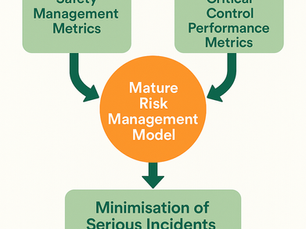Critical Control Management (CCM)
What is Critical Control Management (CCM)?
Critical Control Management (CCM) is a systematic approach to identifying, implementing, and verifying controls that prevent or mitigate high-consequence risks. It focuses on the most important safeguards - those that, if they fail, could lead to catastrophic outcomes such as fatalities, major incidents, or serious business disruptions.
A strong CCM framework ensures that organisations are not just identifying risks but also actively verifying and maintaining the controls designed to prevent and mitigate incidents. It involves defining Critical Control Performance Standards (CCPS), establishing clear accountability, and implementing Critical Control Verification (CCV) processes to check that controls are functioning as intended. Without these mechanisms in place, organisations may assume they are protected while critical gaps go unnoticed.
Critical Control Management is often misunderstood or diluted into activities that miss the mark. Drawing from the Brady Review findings and recent legal outcomes, it’s clear that ineffective CCM programs can lead to catastrophic failures - because the wrong things were measured, managed, or assumed.
A Critical Control Management Program is NOT:
-
A long list of generic controls - More controls don’t equal more protection. CCM is about the few that matter most—the ones that prevent fatal or catastrophic events.
-
A safety procedure or policy - Written documents alone are not controls. If the safeguard can’t fail, it’s not a control—and if no one is checking its function, it’s not managed.
-
An audit or inspection program - CCM is not a general inspection regime. It requires specific verification activities that test the functionality of each critical control - not broad compliance checks.
-
A visible leadership program - Leadership visibility is valuable, but it’s not a substitute for structured, technical control verification or clear control ownership.
-
A compliance activity - If CCM is treated as a paperwork or box-ticking exercise, it loses its power. Compliance might satisfy a regulator, but it won't stop an incident.
-
A duplication of maintenance inspections - Routine maintenance does not equal critical control verification. CCM focuses on the assurance of control effectiveness, not the condition of assets alone.
-
A lagging indicator - By the time a lagging indicator (like an incident) shows up, it’s too late. CCM is a leading practice, designed to identify weak points before something goes wrong.
“Organisations often think they are managing risk, when in fact they are managing paperwork.”
— Dr Sean Brady, Brady Review into Fatalities in the Mining Industry
How We Support Businesses in Critical Control Management
We provide expert-led Critical Control Management solutions to help organisations strengthen control effectiveness, ensure compliance, and prevent serious incidents.
Our services include:
-
Risk Identification: Risk workshops, broadbrush risk assessments to ensure risks are identified and captured.
-
Risk Analysis and Prioritisation: Developing risk bowtie analysis to map causal pathways and prioritise site-specific risks based on potential consequence severity, how quickly an unwanted event can escalate (risk velocity), likelihood of critical control failure, and impacts on business continuity.
-
Critical Control Identification and Mapping: Ensuring the right controls are selected based on risk pathways and failure points, not assumptions. We also analyse your historical incidents and near misses to identify critical control failures that have already occurred, ensuring past lessons are embedded into future safeguards.
-
Critical Control Effectiveness Testing (CCET): Developing a structured CCET process to ensure an evidence-based approach is applied when evaluating the effectiveness of controls—particularly when control strength is used to influence likelihood, consequence, and overall risk ratings.
-
Development of Critical Control Performance Standards (CCPS): Defining measurable expectations for how each control must operate, while also identifying potential erosion factors and failure modes that could compromise effectiveness over time.
-
Implementation of Critical Control Verification (CCV) Programs: Creating structured assurance processes to confirm control effectiveness in real-world conditions.
-
Integration of CCM into Safety and Risk Frameworks: Embedding CCM within risk registers, operational safety plans, and governance structures.
-
Training for Risk and Critical Control Owners: Delivering expert-led training to enhance accountability and ensure control implementation at all levels.
-
CCM Audits and Assurance Reviews: Assessing existing CCM frameworks to identify gaps, weaknesses, and areas for improvement.
-
Understanding and Interpreting Critical Control Performance: Are your CCV results telling the right story? Are you seeing a lot of ‘green’ - but it doesn’t feel right? Are control failures isolated issues, or indicators of deeper, systemic problems? We help you interpret performance data to uncover what’s really going on.
2026 Course Calendar
Upcoming Risk and Critical Control Management Courses

 Multiple DatesRisk Bowtie Analysis Course4 days to the eventFri, 09 JanOrana Skills Centre - White Room
Multiple DatesRisk Bowtie Analysis Course4 days to the eventFri, 09 JanOrana Skills Centre - White Room
 Multiple DatesCritical Control Management Course11 days to the eventFri, 16 JanOrana Skills Centre - White Room
Multiple DatesCritical Control Management Course11 days to the eventFri, 16 JanOrana Skills Centre - White Room


 Multiple Dates2-Day Psychosocial Risk Register Workshop16 days to the eventWed, 21 JanOrana Skills Centre
Multiple Dates2-Day Psychosocial Risk Register Workshop16 days to the eventWed, 21 JanOrana Skills Centre


 Multiple DatesRisk Bowtie Analysis Course18 days to the eventFri, 23 JanOrana Skills Centre - White Room
Multiple DatesRisk Bowtie Analysis Course18 days to the eventFri, 23 JanOrana Skills Centre - White Room



E-Learning
Risk Owner (RO)
$495.00
30 min
Looking for a Partner, Not Just a Provider?
Whether you need a Project Manager to build and implement your CCM program, or a long-term business partner to guide and support you every step of the way—we’re here to help.
Contact us for a quote or to book a free discovery call. Let’s build something that works.




















